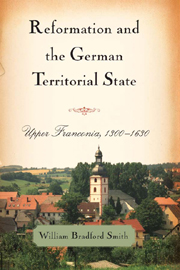Book contents
- Frontmatter
- Contents
- List of Illustrations
- List of Abbreviations
- Acknowledgments
- Introduction
- Chapter 1 Territory and Community
- Chapter 2 Rebellion, Representation, and Reform
- Chapter 3 “Lord in Our Own House”
- Chapter 4 Reformation and Revolution
- Chapter 5 The Limits of Obedience
- Chapter 6 A Plague of Preachers
- Chapter 7 Orthodoxy and Order
- Chapter 8 The Christian Commune
- Chapter 9 Cuius Regio?
- Chapter 10 The Stool of Wickedness
- Conclusion
- Notes
- Bibliography
- Index
Chapter 8 - The Christian Commune
Published online by Cambridge University Press: 12 September 2012
- Frontmatter
- Contents
- List of Illustrations
- List of Abbreviations
- Acknowledgments
- Introduction
- Chapter 1 Territory and Community
- Chapter 2 Rebellion, Representation, and Reform
- Chapter 3 “Lord in Our Own House”
- Chapter 4 Reformation and Revolution
- Chapter 5 The Limits of Obedience
- Chapter 6 A Plague of Preachers
- Chapter 7 Orthodoxy and Order
- Chapter 8 The Christian Commune
- Chapter 9 Cuius Regio?
- Chapter 10 The Stool of Wickedness
- Conclusion
- Notes
- Bibliography
- Index
Summary
The religious history of upper Franconia during the first decades of the confessional era presents a complex and often contradictory set of images. Events in both the Hochstift Bamberg and the Hohenzollern Oberland make it difficult to perceive a clear alliance between ecclesiastical and state interests either at court or in the villages. The reform of marriage and the formation of the clerical estate both reveal deep fissures within the ecclesiastical regime and between secular and spiritual officials. The experience of pastors at the local level argues against an alliance of “pulpit and administration (Kanzel und Amtshaus) that engendered social control.” Reforms took place within a matrix containing a variety of powers and interests: the prince, secular officials, ecclesiastical officials, communal officials, nobles, families, and foreign powers, to name a few. At the center of the matrix stood the parish clergy, constantly pulled by the shifting and contradictory demands of the various powers. Pastors could not simply spread the “orders” of the central regime down to its subjects so long as local officials, patrons, nobles, and the parish community refused to cooperate. And, as we have seen, the central regime did not always hold a consistent vision of the “proper order.” Local conditions were hardly conducive to the imposition of alien religious and social norms; divisions within the regime prevented the articulation of an unambiguous definition of norms in the first place.
- Type
- Chapter
- Information
- Reformation and the German Territorial StateUpper Franconia, 1300–1630, pp. 130 - 148Publisher: Boydell & BrewerPrint publication year: 2008



